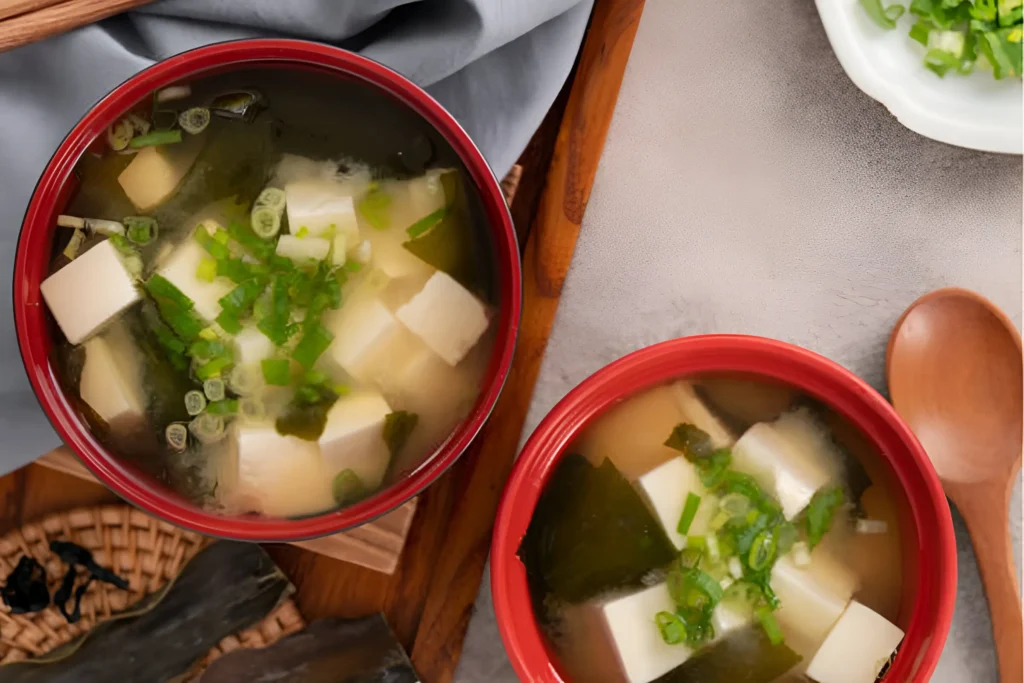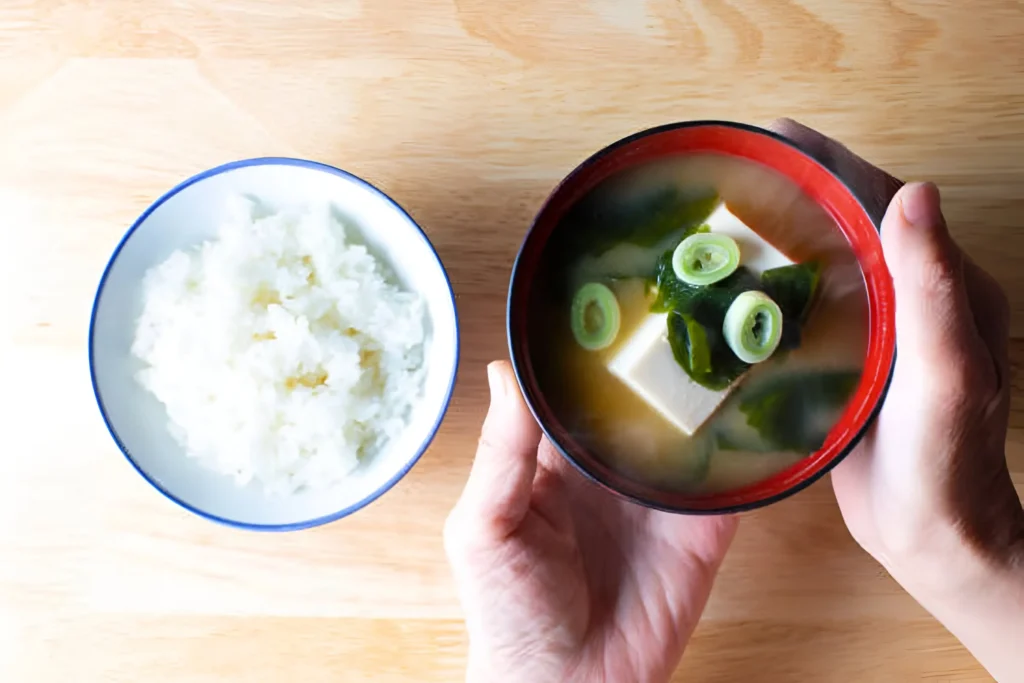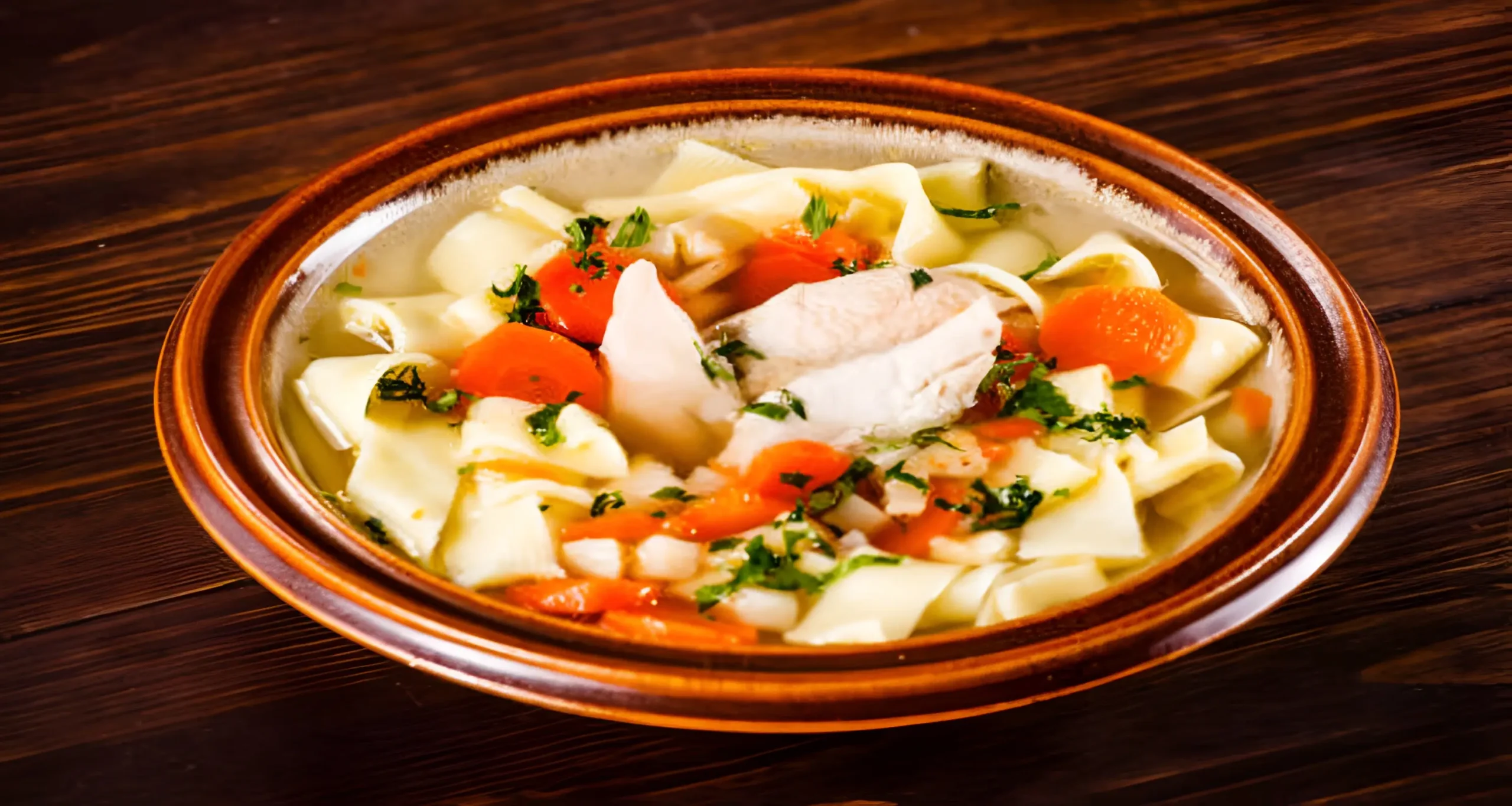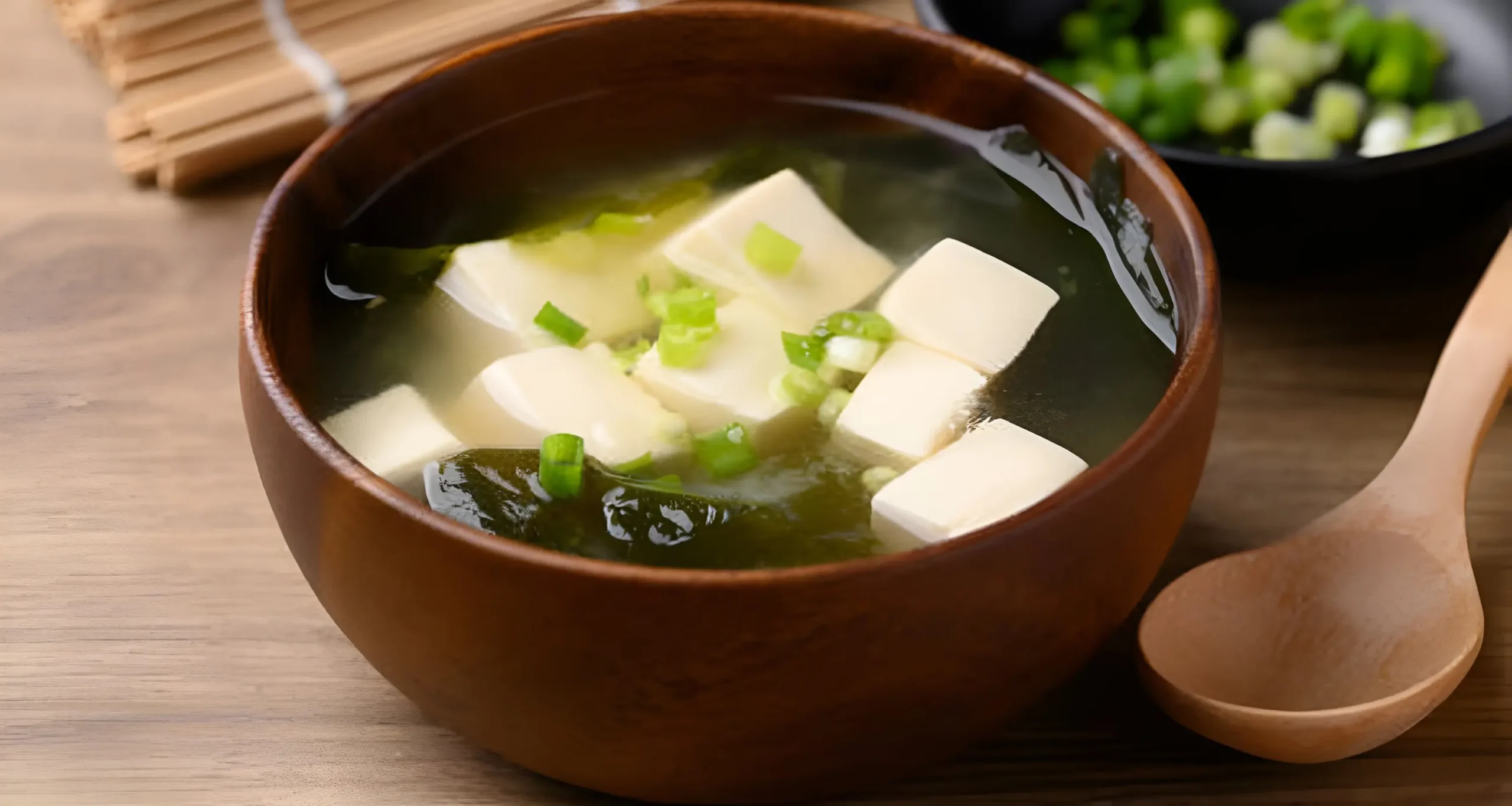Miso Soup Calories: 8 Gut-Friendly Swaps for Better Digestion

Miso soup is a tasty part of Japanese food and great for your gut. Knowing how many calories it has is key for better digestion and health. It’s full of good stuff for your stomach, making it a smart choice for your diet. We’ll look at Miso Soup Calories count and share easy ways to make it better for your digestion.
Key Takeaways
- Miso soup offers numerous gut health benefits.
- Understanding miso soup calories is critical for effective meal planning.
- There are several gut-friendly ingredients to enhance the soup.
- Making simple swaps can boost its nutritional profile.
- Incorporating fresh ingredients maximizes benefits.
Introduction to Miso Soup and Its Benefits
Miso soup is a beloved traditional Japanese dish. It’s known for its comforting warmth and rich flavors. The main ingredient, miso paste, is full of probiotics, making it great for digestion.
But miso soup offers more than just taste. It helps improve nutrient absorption and keeps your gut healthy. Adding it to your meals can boost your overall health.
Miso soup is also packed with vitamins and minerals. It’s a key part of a healthy diet. It supports digestion and makes meals more enjoyable. It’s good for your stomach and overall health.
Miso Soup Calories: What You Need to Know
Knowing about miso soup calories is key for smart food choices. A typical serving, about 1 cup (240 ml), has around 35-50 calories. This makes it a great choice for those looking for lighter meals.
Understanding Serving Sizes
It’s important to know the serving sizes of miso soup. Each cup is a tasty, low-calorie option. It lets you enjoy a delicious dish without too many calories. This makes miso soup a great part of a healthy diet.
Comparison with Other Soups
Miso Soup Calories stands out when compared to other soups. Soups like clam chowder can have 200 to 300 calories per serving. But miso soup is lower in calories, making it popular among those who care about their health.
Nutritional Profile of Miso Soup
Miso soup is a tasty dish with many ingredients that boost its nutritional value. Each ingredient adds something special to the soup’s health benefits.
Main Ingredients and Their Benefits
The key ingredients in miso soup are miso paste, tofu, and seaweed. They all play important roles in making the soup nutritious:
- Miso paste is a fermented product full of probiotics. It helps keep your gut healthy.
- Tofu is a great plant-based protein source. It gives you essential amino acids.
- Seaweed is rich in vitamins and minerals like calcium and iodine. It helps keep you well.
Understanding Miso Paste Nutrition
Looking at miso nutrition facts shows its high nutritional value. Miso paste adds flavor and nutrients like B vitamins, antioxidants, and minerals to the soup. The health benefits of miso soup vary based on the ingredients and their amounts. But, it usually has few calories.
Miso Soup Calories
Miso soup is a nutritious and comforting choice for many diets. To understand its miso Soup Calories, we need to look at its ingredients. This section will explore how different ingredients affect the calorie count.
Breakdown of Ingredients
The main ingredients in miso soup are miso paste, tofu, seaweed, and water. You can also add vegetables and proteins. Here’s a table showing the calories in common miso soup ingredients:
| Ingredient | Serving Size | Calories |
|---|---|---|
| Miso Paste | 1 tablespoon | 30 |
| Tofu (firm) | 1 ounce | 20 |
| Seaweed (wakame) | 1 tablespoon | 5 |
| Vegetables (carrots, celery) | 1/4 cup | 10-15 |
| Noodles (if added) | 1 ounce | 100 |
Factors Affecting Caloric Content
The miso Soup Calories in your miso soup can change a lot. The type of miso you use affects the calories. Adding toppings like fried onions or extra proteins also increases the calories.
How you prepare the soup, like boiling or steaming, can also matter. Knowing these factors helps you make choices that fit your diet.
Miso Nutrition Facts: The Gut-Friendly Benefits
Miso is a nutritional powerhouse, offering miso nutrition benefits that boost your health. This fermented soybean paste is full of probiotics. These help keep your gut health in balance by supporting good bacteria in your stomach. Eating miso regularly can also help with digestion and prevent stomach problems.
Miso is not just good for your gut. It’s also rich in vitamins and minerals. It has vitamins B, E, and K, which are important for your body’s functions. Plus, it’s loaded with manganese and copper, key for energy and a strong immune system.
Adding miso to your meals not only makes food taste better. It also gives you a nutritional boost that supports your overall health. The fermentation process makes it even more beneficial, especially for those who care about gut health.
Common Ingredients in Miso Soup and Their Impact on Digestion

Miso soup is not just tasty; it’s also full of ingredients that boost your health. Knowing how these ingredients affect digestion can make you appreciate cooking more. Let’s look at two key ingredients: tofu and seaweed.
How Tofu Contributes to Nutritional Value
Tofu is a key part of miso soup, known for its nutritional value. It’s a plant-based protein that helps keep muscles strong and supports overall health. Plus, tofu is easy to digest, making it good for your gut.
The Role of Seaweed in Gut Health
Seaweed is another important part of Miso Soup Calories, adding to seaweed’s health with its fiber. This fiber helps with digestion, keeping your bowels regular and your gut healthy. Seaweed also has iodine, which is good for your thyroid and hormones, adding to its health benefits.
8 Gut-Friendly Swaps for Miso Soup Calories
Adding gut-friendly swaps to your miso Soup Calories can make it healthier and tastier. Try these changes for a soup that’s good for your digestion.
Using Low-Sodium Miso
Choose low-sodium miso to cut down on sodium. This choice is good for your heart and keeps the soup’s flavor rich. You can enjoy your soup without losing its taste.
Adding Fermented Vegetables
Add fermented veggies like kimchi or sauerkraut to your soup. They bring probiotics for better digestion and add depth to the flavor.
Switching to Vegetable Broth
Use vegetable broth instead of traditional broth for a lighter taste. This change makes your soup more nutritious and low in calories. It’s great for those looking for a healthier option.
Incorporating Bone Broth for Added Nutrients
For a richer flavor, try bone broth. It adds collagen and minerals, boosting your soup’s health benefits for your gut.
Opting for Whole Grains Instead of Noodles
Swap noodles for whole grains like quinoa or barley. This change boosts fiber, aiding digestion and adding a nice texture to your soup.
Enhancing Flavor Without Extra Calories

Looking for ways to make Miso Soup Calories taste better without adding calories? There are many herbs and seasonings that can do just that. They add exciting flavors without the extra calories.
Herbs and Spices for Flavor Boosts
Fresh herbs like cilantro, green onions, and lemongrass can turn miso soup into a flavorful dish. They bring aromatic scents and nutritional value, making your soup healthier. Spices like ginger or garlic powder add depth and warmth to the taste.
Low-Calorie Seasoning Options
Seasonings like rice vinegar or lime juice add a zesty kick without extra calories. They brighten the dish and balance the rich taste of miso paste. Try different ingredients to find your favorite flavors.
| Herb/Seasoning | Flavor Profile | Calories per Serving |
|---|---|---|
| Cilantro | Citrusy, bright | 1 |
| Green Onions | Pungent, crisp | 5 |
| Lemongrass | Refreshing, lemony | 2 |
| Rice Vinegar | Tangy, mild | 0 |
| Lime Juice | Zesty, sharp | 1 |
Serving Suggestions for Miso Soup
Think about serving miso soup with healthy sides for a complete meal. Adding nutrient-rich foods boosts flavor and nutrition. This makes your meal more satisfying.
Pairing Miso Soup with Healthy Sides
For a balanced meal, try these pairings:
- Steamed veggies like broccoli or carrots add vitamins.
- Fresh salads with leafy greens boost fiber and nutrients.
- Whole-grain rice gives you complex carbs for energy.
Portion Control Tips
Controlling portions is crucial with miso soup. Use smaller bowls to manage your servings. This way, you enjoy your soup without overeating.
Balance your plate with protein, healthy fats, and carbs in moderation. This ensures a nutritious meal.
How to Make Miso Soup Healthier at Home
Making homemade miso soup lets you control every part of the dish. You can make your own miso paste with organic ingredients. This boosts both taste and nutrition. Adding fresh ingredients makes your soup full of flavor and health benefits.
DIY Miso Paste for Better Nutrition
Making your own miso paste can make your soup healthier. Use:
- Organic soybeans or chickpeas
- Natural sea salt
- Aging techniques like fermentation for added benefits
This way, you avoid preservatives and sugars found in store-bought miso. It makes a better base for your soup.
Using Fresh Ingredients to Maximize Benefits
Adding fresh ingredients makes your miso Soup Calories even better. Try:
- Seasonal vegetables like carrots, spinach, and mushrooms
- Proteins like tofu or tempeh for texture
- Herbs like green onions or cilantro for flavor
These add to the taste and health benefits of your soup. They help with digestion and make your meal light yet filling.
Conclusion
Miso soup is a great choice for healthy eating. It’s good for your gut and packed with nutrients. By looking at its calories and ingredients, you see how it boosts your health.
Adding suggested changes can make it even better. This fits well with your diet goals.
Miso Soup Calories is not just good for your stomach. It also adds lots of flavor to your meals. Using fresh ingredients, it becomes a tasty part of your daily diet.
Knowing how to balance its taste and health benefits helps you make smart choices. Miso soup can be a wonderful start to your meals or a full, healthy dish. It’s a great addition to your healthy eating plan.
FAQ
What are the typical miso soup calories in a serving?
A standard serving of miso soup, about 1 cup (240 ml), has 35-50 calories. This makes it a good choice for a healthy meal.
What nutritional benefits does Miso Soup Calories offer?
Miso Soup Calories is full of probiotics, which help your gut and improve nutrient absorption. It also has vitamins and minerals from tofu and seaweed, making it very nutritious.
How do different ingredients affect the calories in miso soup?
The calories in Miso Soup Calories change based on what you add. A simple mix of water, miso paste, and tofu is under 50 calories. But adding veggies, proteins, or noodles can up the calorie count.
What are the miso nutrition facts I should know?
Miso is fermented and packed with good bacteria. It’s also rich in vitamins B, E, and K, and minerals like manganese and copper. These help keep you healthy.
How can I make miso soup healthier?
To make miso soup healthier, use low-sodium miso and add fermented veggies for more probiotics. Try vegetable or bone broth instead of water for extra nutrients. Swapping noodles for whole grains can also help digestion.
What are the common ingredients in Miso Soup Calories?
Common ingredients are miso paste, tofu, seaweed, and green onions. Tofu adds protein, and seaweed brings minerals. These ingredients make the soup nutritious.
Can I enhance the flavor of miso soup without adding calories?
Yes, you can add fresh herbs like cilantro, lemongrass, and green onions for flavor. Rice vinegar or lime juice also add taste without extra calories.
How does miso paste nutrition vary by type?
Miso paste comes in white, yellow, and red varieties, each with different flavors and nutrients. Darker varieties have more vitamins and minerals because they ferment longer.
How many calories are in a miso soup with tofu?
A Miso Soup Calories with tofu has about 40-60 calories per serving. This count changes based on tofu amount and any extra ingredients like veggies or noodles.
What is the best way to pair miso soup for a balanced meal?
Miso Soup Calories pairs well with healthy sides like steamed veggies, salads, or whole-grain rice. These combinations offer a balanced meal with protein, carbs, and healthy fats.
Add a Dash of Your Thoughts!
There are no reviews yet. Be the first one to write one.






